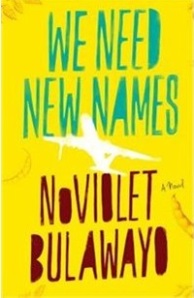We were on our way to Budapest: Bastard and Chipo and Godknows and Sbho and Stina and me. We are going even though we are not allowed to cross Mzilikazi Road, even though Bastard is supposed to be watching his little sister Fraction, even though Mother would kill me dead if she found out; we are just going. There are guavas to steal in Budapest, and right now I’d rather die for guavas. We didn’t eat this morning and my stomach feels like somebody just took a shovel and dug everything out.
The setting is present day Zimbabwe. The narrator is 10-year-old Darling — she and her running mates live in a shantytown but frequently head off to upper-class Budapest to steal guavas. They even have a rather sophisticated plan to “harvest” the fruit street by street, despite the fact that eating it so quickly leads to significant digestive problems. Food is food, after all.
 Child narrators are a convenient device for authors, particularly in troubled settings like Zimbabwe, and it is easy to understand why. The pre-teen point of view allows the author to abandon nuance and concentrate on a few major themes (poverty, oppression) as they are experienced by a maturing youth. The problem, of course, is the very loss of that nuance — unless the major themes are drawn so precisely and deliberately, they read like a statement of the obvious.
Child narrators are a convenient device for authors, particularly in troubled settings like Zimbabwe, and it is easy to understand why. The pre-teen point of view allows the author to abandon nuance and concentrate on a few major themes (poverty, oppression) as they are experienced by a maturing youth. The problem, of course, is the very loss of that nuance — unless the major themes are drawn so precisely and deliberately, they read like a statement of the obvious.
The opening paragraph supplies one example, so let’s try another. The gang is on their way back to Paradise, the shantytown where they live:
Going back to Paradise, we do not run. We just walk nicely like Budapest is now our country too, like we built it even, eating guavas along the way and spitting the peels all over to make the place dirty. We stop at the corner of AU Street for Chipo to vomit; it happens most of the time she eats. Today her vomit looks like urine, only thicker. We leave it there uncovered.
One day I will live here, in a house just like that, Sbho says, biting into a thick guava. She points to the big blue house with the long row of steps, flowers all around it. A really nice house, but not nicer than where we just got the guavas. Sbho’s voice sounds like she is not playing, like she knows what she is talking about. I watch her chew, her cheeks bulging. She swallows, starts to peel what is left of the guava with her side teeth.
How are you going to do that? I ask. Sbho spits the peels and says, with her big eyes, I just know it.
It is election time in Zimbabwe and that plays a role in the novel as well. The families of the gang are on the wrong side (non Mugabe, although he is never mentioned by name) — that is how they ended up in the shantytown in the first place. Needless to say, the election does not turn out well for them,
And there is also the Sickness. Darling’s father returns from working the mines in South Africa, literally a mere shadow of his former self due to the Sickness. He retreats to a cot and his inevitable death.
While those kinds of themes occupy the first half of the novel, Bulawayo expands her canvas in the second half by sending Darling to stay with an aunt in America (Destroyedmichygen is her port of entry):
With all the snow, with the sun not there, with the cold and the dreariness, this place doesn’t look like my America, doesn’t even look real. It’s like we are in a terrible story, like we’re in the crazy parts of the Bible, there where God is busy punishing people for their sins and is making them miserable with all the weather. The sky, for example, has stayed white all this time I have been here, which tells you that something is not right. Even the stones know that a sky is supposed to be blue, so blue you can spray Clorox on it and wipe it with a paper towel and it wouldn’t even come off.
The child narrator story becomes a coming-of-age one in America — unfortunately the events that take place there are every bit as predictable as the ones in Africa were.
In the final analysis, predictability is the problem that I had with We Need New Names. Bulawayo certainly has her charming moments, but they are only moments. Corrupt politics, AIDS, racism in American schools and other weighty issues arise in predictable fashion and receive a treatment that supplies no surprises or insight — the story simply moves on. Perhaps if I had been able to more deeply engage with Darling I would have found more in the book; for me she was pretty much a normal 10-year-old facing challenging circumstances.
Given their interest in unusual structures, as shown by the longlist, I have trouble fathoming how the Booker Jury came to move this one on to the shortlist. The novel features a completely conventional structure, the story has been told before — We Need New Names is a readable book, but not one that will live on in memory.
